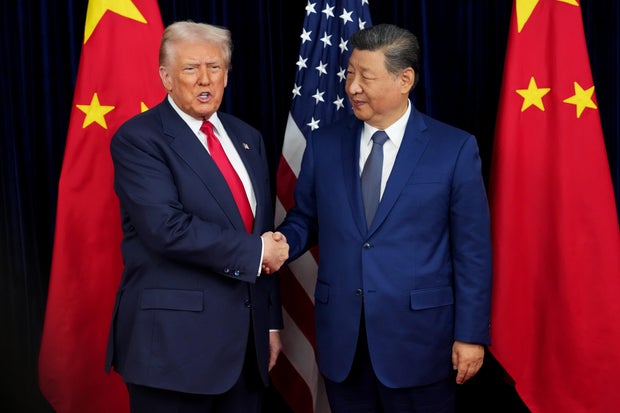Washington — President Trump said Thursday he will cut U.S. tariffs on Chinese goods after he sat down with Chinese President Xi Jinping for a high-stakes summit in South Korea in the midst of a months-long trade war between the world’s two largest economies.
“On the scale from zero to 10, with 10 being the best, I would say the meeting was a 12,” Mr. Trump told reporters on Air Force One while flying back to Washington from the South Korean city of Busan. He called his more than 90-minute session with Xi an “amazing meeting” and a “great success.”
Mr. Trump told reporters “we have a deal” on trade, saying he expects to sign an agreement “pretty soon,” though he’s likely to renegotiate it in future years. “A lot of things we brought to finalization” during Thursday’s discussions, the president added, calling Xi a “tremendous leader of a very powerful country.”
Mr. Trump said he decided to lower his overall tariff rate on imports of Chinese goods from 57% to 47%, after promises by Xi to curtail shipments of fentanyl ingredients to the U.S. Levies of 47% would still leave China with one of the highest tariff rates the U.S. imposes.
He also told reporters China will resume purchasing U.S. soybeans “immediately” after a boycott by China left Americans farmers reeling, and he said a conflict over Chinese restrictions on rare earth exports was “settled.” Details on those agreements remain sparse.
He told reporters he would go to China in April for new talks, and Xi will “be coming here sometime after that, whether it’s in Florida, Palm Beach or Washington, D.C.”
The two leaders met on a South Korean military base at the tail end of an almost weeklong trip through Asia by Mr. Trump.
Prior to the meeting, Mr. Trump said he has a good relationship with Xi “but he’s a very tough negotiator. That’s not good.”
Xi said trade negotiators from both sides have made progress in addressing “major concerns” and he believes the U.S. and China should be “partners and friends.”
“Given our different national conditions, we do not always see eye-to-eye with each other, and it is normal for the two leading economies of the world to have frictions now and then,” Xi said through an interpreter, though he noted that relations have been “stable on the whole.”
China is the U.S.’s third-largest trading partner, behind only Mexico and Canada, with the U.S. buying $438.9 billion in Chinese goods last year, while China bought $143.5 billion in goods from the U.S. But Mr. Trump has pushed for higher tariffs on Chinese imports, both due to fentanyl trafficking and alleged unfair trade practices, sparking a trade war.
The two sides briefly levied massive tit-for-tat tariffs on each other in April, before delaying those levies to buy time for negotiations. In August, Mr. Trump signed an executive action delaying the reinstatement of higher tariffs on Chinese goods for another 90 days, extending the pause until mid-November.
U.S. and Chinese officials have been holding trade talks for months leading up to Thursday’s Trump-Xi meeting.
Earlier this month, Mr. Trump threatened to impose an additional 100% tariff rate on Chinese goods starting Nov. 1 in retaliation for China’s increased export controls on rare earth minerals and magnets, which would bring total tariffs on Chinese imports as high as 155%. China has the vast majority of the world’s supply of those raw materials, critical for manufacturing in key technology areas like semiconductors and missiles. Those extra 100% tariffs are “effectively off the table” for now, Treasury Secretary Scott Bessent said Sunday on “Face the Nation with Margaret Brennan.”
Bessent said he also expects Mr. Trump and Xi to sign a deal Thursday placing TikTok under majority U.S. ownership, although Chinese-owned ByteDance could still have a minority ownership stake of under 20%.
Defense is another point of tension between China and the U.S.
Mr. Trump’s first secretary of state, Mike Pompeo, said he should commit to Taiwan’s independence.
“Xi Jinping is expected to press President Trump for clarity about America’s stance toward Taiwan at their meeting this week,” Pompeo wrote on social media. “America should oblige — and affirm our unequivocal commitment to Taiwan’s sovereignty and independence from Beijing.”
But on the trip home, Mr. Trump told reporters he and Xi didn’t discuss Taiwan.
Separately, moments before the meeting with Xi began, Mr. Trump wrote on Truth Social that he’s directed the Pentagon to restart nuclear weapons testing. And the president said earlier Wednesday that he will allow South Korea, a rival of China’s, to develop a nuclear-powered submarine.
The last time Mr. Trump and Xi met in person was on the sidelines of the Group of 20 summit in Japan in 2019, during Mr. Trump’s first term in office, although the two leaders have spoken by phone. The last conversation the White House disclosed between the two men was on Sept. 19.
Busan, known as an educational and cultural center along Korea’s southeastern coast, is the second most populous city in South Korea behind its capital, Seoul. The Xi meeting is the final agenda item on Mr. Trump’s schedule for his five-day Asia tour, concluding a trip primarily intended to strengthen economic ties and cement trade deals in the South Pacific region.

